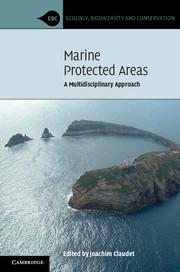Book contents
- Frontmatter
- Contents
- Contributors
- Introduction
- Part I Threats to marine ecosystems and resources
- Part II Effects of marine protected areas
- 2 ECOLOGY – Ecological effects of marine protected areas: conservation, restoration, and functioning
- 3 FISHERIES – Effects of marine protected areas on local fisheries: evidence from empirical studies
- 4 BIOECONOMY – Economically optimal spatial and inter-temporal fishing patterns in a metapopulation
- 5 SOCIO-ECONOMY – Social dynamics of scaling-up marine protected area declarations and management
- Part III Assessment of the effectiveness of marine protected areas
- Part IV Scale-up of marine protected area systems
- Index
- References
5 - SOCIO-ECONOMY – Social dynamics of scaling-up marine protected area declarations and management
from Part II - Effects of marine protected areas
Published online by Cambridge University Press: 05 August 2012
- Frontmatter
- Contents
- Contributors
- Introduction
- Part I Threats to marine ecosystems and resources
- Part II Effects of marine protected areas
- 2 ECOLOGY – Ecological effects of marine protected areas: conservation, restoration, and functioning
- 3 FISHERIES – Effects of marine protected areas on local fisheries: evidence from empirical studies
- 4 BIOECONOMY – Economically optimal spatial and inter-temporal fishing patterns in a metapopulation
- 5 SOCIO-ECONOMY – Social dynamics of scaling-up marine protected area declarations and management
- Part III Assessment of the effectiveness of marine protected areas
- Part IV Scale-up of marine protected area systems
- Index
- References
Summary
Introduction
Marine protected areas (MPAs) are increasingly used for multiple goals – sustainable fisheries, economic development, and biodiversity conservation being among the most important. As such, they involve a wide variety of constituencies and spawn complex management processes (Pollnac et al., 2001; Jones, 2006; Christie et al., 2009a). Social research, ideally integrated with biophysical research, plays an important role in the design, adaptive management, and evaluation of MPAs. The field of MPA-related social research is rapidly expanding (Jones, 2006; Cinner, 2007; Pollnac et al., 2010), and has the potential to improve theories of environmental management and MPA management effectiveness. Currently, there appears to be growing interest among donors, non-governmental organizations, government agencies, and academics to fill the once notable gap in understanding.
Social research on MPAs appropriately consists of both basic and applied, mandate-responsive and mandate-independent research (Christie et al., 2003). As reviewed in this volume, it utilizes a variety of research methods, generating quantitative and qualitative information which can provide broad and specific analyses. Increasingly, integrated approaches are providing socio-ecological analyses either through integration (Aswani and Hamilton, 2004; Christie, 2005; Pollnac et al., 2010) or serial analysis (Stoffle et al., 2010) of social and ecological data (Christie, 2011). Ideally, these analyses are integrated into MPA management and evaluation within an adaptive planning framework, a practice which is complex but results in better MPA management, convincing documentation of MPA impacts, and learning (McClanahan et al., 2005; Armada et al., 2009; Eisma-Osorio et al., 2009; Lowry et al., 2009). There is little doubt that socio-economic considerations and effective MPA management determine the long-term success of any MPA.
- Type
- Chapter
- Information
- Marine Protected AreasA Multidisciplinary Approach, pp. 121 - 140Publisher: Cambridge University PressPrint publication year: 2011
References
- 5
- Cited by



